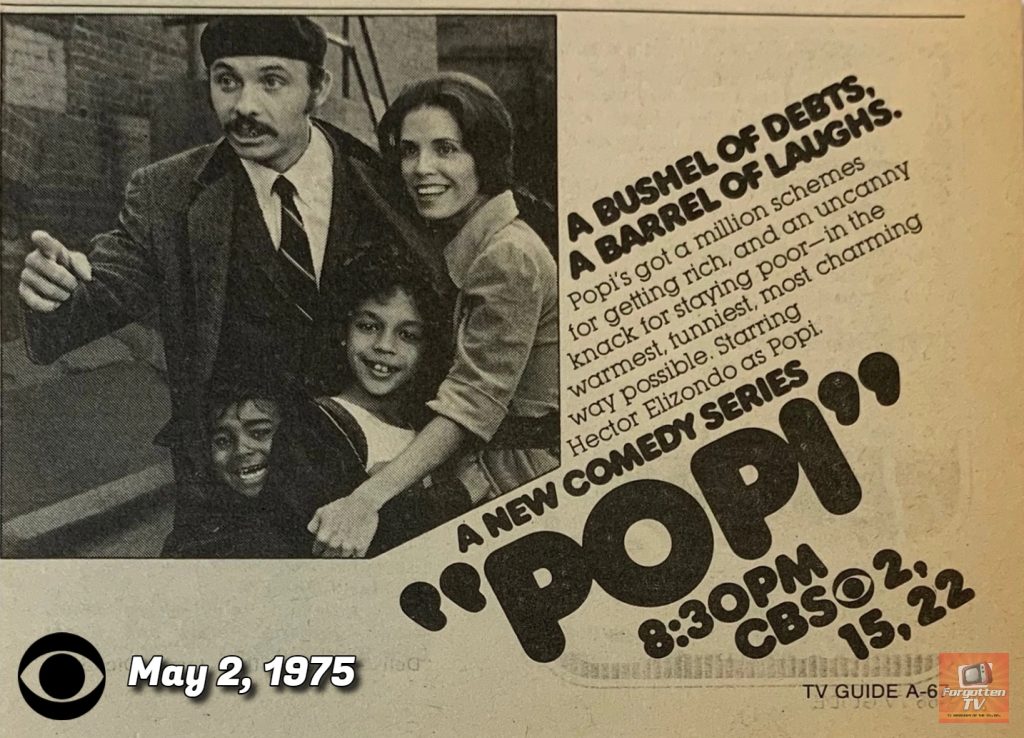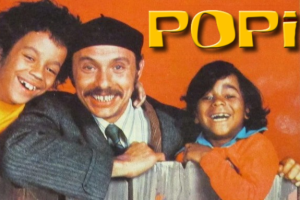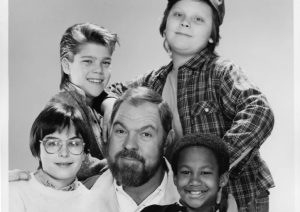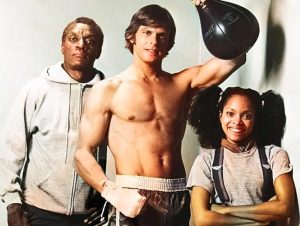Popi (1975)
Forgotten TV is reader/listener supported. This article or podcast may contain affiliate links to Amazon or other retailers. As an affiliate, Forgotten TV earns royalties from these purchases, at no extra cost to you.

Debuting May 2, 1975. CBS, 8:30/7:30pm Central
This relatively obscure entry was a half-hour sitcom pilot and later series based on the 1969 film Popi with Alan Arkin and Rita Moreno. The film was the story of Abraham Rodriguez (Arkin), a Puerto Rican widower struggling to raise his two young boys, 11-year-old Junior (Miguel Alejandro) and 9-year-old Luis (Reuben Figueroa), in the squalor of New York’s Spanish Harlem. Popi works three jobs to provide for his family, but fears losing his sons to ghetto life. He has two main aims: to marry his girlfriend Lupe (Moreno) and move to Brooklyn, and to ensure his sons a decent future.
Things come to a head after he learns his sons have told neighborhood boys their father is a gangster, which results in a violent incident. After working a banquet for Cuban refugees, Popi begins to hatch a scheme. Realizing America is more generous to political refugees than the common poor, he plans to set his sons adrift in a rowboat off Miami to stage their discovery as Cuban escapees to receive asylum, and with it, a better life than he can offer. Posing as a writer, he interviews Cuban immigrants for information on the country. After teaching his boys details about Cuba, as well as how to row and motor a boat, he takes them via bus to Miami, where he steals a rowboat, and sends them out with specific instructions to return to shore by rowing after they discard the motor. After too much time passes, Popi fears the boys are lost and almost drowns himself but hears a radio report about the rescue of “two brave Cuban boys”.
Found dehydrated and sunburned, the boys are hospitalized and showered with attention from the public, including flowers, toys, adoption offers, and even an invitation to the White House. Disguised, Popi sneaks in to let them know the scheme was working, and they would soon have a better life. Overwhelmed with emotion, the boys utterly reject this plan, and their loud argument alerts the staff. With the hoax exposed, they all happily return to their old neighborhood with their loving father.
Popi was generally well-received, with some criticizing the uneven story, such as Roger Ebert, who noted “the first half, set in New York, is rich and warm, filled with the flavor of city life. The second half, involving the Florida plan, functions only on the level of TV situation comedy.” Funny he should say that…apparently screenwriters Lester and Tina Pine, as well as producer Herbert Leonard, came around to thinking the same thing.
Leonard first had Alan Arkin in mind for the series lead, but he was unavailable, possibly busy for the upcoming Baby Blue Marine (1976), in pre-production at the time. Arkin was the one who suggested Hector Elizondo for the part, saying “The guy is better than I am.” This led Leonard to head to Elizondo’s off-Broadway appearance in Steambath (in which he played God), telling columnist Tom Riste,
“He was simply terrific. I knew right then I had the lead for Popi. One of [the] main virtues [of the show] is the ability of Abraham Rodriguez to laugh at himself. He’s really a very heroic character, a man determined to survive. He is no caricature, but a warm and humorous man.”
In February 1975, the production of the Popi pilot was announced, with Hector Elizondo stepping into the title role. With Puerto Rican actress Liz Torres as Lupe, and newcomers Anthony Perez as Junior, and Dennis Vasquez as Luis, the pilot started off CBS’s Friday evening on May 2. Titled “The Ragamuffin Army”, the story had Popi still wanting to better the lives of his “hooky-playing, numbers-running boys” – but this time with a far less extreme plan – by having them join the boy scouts with Popi serving as scoutmaster!
The show returned as a series the following January as a mid-season replacement for the failed Joe and Sons. Edith Diaz replaced Torres as Abraham’s neighbor and love interest. There were 10 additional episodes produced, and I’ve been able to dig into old TV listings to fill out episode descriptions not previously findable online, which are now entered into IMDB. In “Man’s Best Amigo”, the boys decide to ‘adopt’ a Great Dane, which wreaks havoc on their tiny apartment, not to mention the food budget. But Popi gets an idea of how to make money with the dog. “It’s Crazy to Have a Car in New York” saw Popi receive a run-down car as payment for a debt, which causes more trouble than it is worth, especially since Popi does not have a driver’s license. In “The Orphans”, Junior and Luis scam the neighborhood for funeral expenses for the still living Popi. “Love Letters” had the boys decide it was time for Popi to marry Lupe, so they concoct an elaborate scheme to make him jealous. In “A Box of Havana Cigars”, Popi tries to get a promotion at work using illegal imported cigars, which gives his sons big ideas for a class president campaign. For “The Vacation”, Popi and the boys apartment-sit for a well-off family that goes on vacation, whose son (Robbie Rist) finds the boys hilarious. Meanwhile, their own apartment is broken into by the boy Popi hired to guard it. “The Mugger” had Popi save up money to buy a new bed for the boys, only to end up fighting a mugger who turns out to be someone he thought was his friend. “Summertime, and the Livin’ Ain’t Easy” carried no plot description. In “Oh, Promise Me”, a woman from Puerto Rico shows up out of Popi’s past now wealthy and wanting to marry him. And in the final episode “With This Ring”, Junior wants to pledge future marriage to his girlfriend in accordance with Puerto Rican custom…to the dismay of her wealthy father.
The show aired on Tuesdays at 8:30/7:30 pm following Good Times…but fellow newcomer Laverne & Shirley, becoming a near-instant hit in the wake of its Happy Days lead-in proved to be too much for Popi. After the third airing, the show was in trouble, prompting speculation that the show would be canceled if ratings did not improve. The week following the sixth series episode, the show was pre-empted for a special one-hour M*A*S*H, however, the following week, Popi did not return. Two weeks later, the show was officially canceled. CBS burned off the final four episodes in July and August.
Very little background information is available regarding this series. I even found conflicting information about the theme song used; period articles refer to the theme used as “It’s Gonna Be Terrific”, possibly sung by Hector Elizondo as Popi. Whether or not this is the same theme as the one Vincent Terrace’s reference book on TV openings refers to, “Popi’s Theme” composed by George Del Barrio, is not known. But I am pleased to present an audio recording of the theme not heard in nearly 50 years, courtesy TV historian Billy Ingram. Here are the lyrics so you can sing along with Popi and the boys:
Sometimes you want to stay in bed
so you pull the covers all over your head
if you jump up and move instead…
It’s gonna be terrific!The best things to see are free you know
that’s right, like the stars and the moon and the snow
go to the park and watch things grow…
It’s gonna be terrific!Look at all we have here
so much to enjoy
hot dog buns and long home runs
oh boy, that’s America!I got lotta plans in my beret
I’m going to be ready in every way
maybe my dream come true today, why?
It’s gonna be terrific!
Popi was filmed single-camera style with a laughtrack added, as noted by Hector Elizondo, who praised the show in a period article.
“I’m excited about doing Popi and I feel that it is a quality show. I think it’s the only comedy series except M*A*S*H that isn’t shot entirely in a studio. We don’t perform in front of an audience, and we don’t have to rely on audience reaction. We can do without the one-liners and emphasize characterization. Abraham Rodriguez is not a silly man. I wouldn’t have agreed to do the part had he been. He is a working-class man, an immigrant with limited education and an accent, but he has integrity and dignity, and he commands respect from his fellow. workers as well as his sons. I’m not a comedian myself – I’m an actor who has played a wide variety of roles on the stage, in several movies and on television. But, like Popi, I can see the humor in certain situations. I like the distinction Walter Matthau made between a comedian and a humorist. A comedian, he said, says funny things, whereas a humorist says things funny.”
The actors stepping in to play the boys – 9-year-old Anthony Perez and 7-year-old Dennis Vazquez – were complete amateurs, having never acted or even studied acting. Just like the original film, they were selected as the result of a casting call that went out to New York City elementary schools which produced some 2,000 applicants. These were whittled down to 18, with Elizondo involved in the casting process. However, they were not given the extensive training and preparation that Alejandro and Figueroa were for the feature film, as documented in the 1969 ‘making of’ short One Summer of Stardom. This lack of series prep came back to bite the production, judging from comments made by Elizondo some 40 years later in his interviews with the Television Academy, calling the boys “the children of Beelzebub”, and noting how often the rambunctious youngsters had to be corralled.
Popi (along with On the Rocks and Viva Valdez, also airing that season) was notable for being one of the earliest TV series featuring a Latino cast and theme. However, Elizondo later noted the lack of Latino writers behind the scenes, an issue that plagued the other series as well. This was also pointed out by Puerto Rican costar Edith Diaz, who told Dick Kleiner in a period article, “In one script, I caught two errors. There was reference to the president of Puerto Rico, but we don’t have a president, we have a governor. And the script talked about how Puerto Rico is owned by the United States, but we’re not owned, we’re more like a commonwealth.” Her criticisms even extended to the title, which originated with the film. “The title was wrong. It’s Papi, not Popi. And it is not only what kids call their father, but what girls call their boyfriends. And the name of the character I play was wrong. Lupe isn’t a Puerto Rican name. It’s a Mexican name, coming from Guadalupe, the patron saint of Mexico. You never heard of a Puerto Rican girl named Lupe.”
AP writer Jay Sharbutt called Popi “a well-written, endearing, warm, and human comedy.” Buck Biggers commented, “Although the concept for Popi was sufficient to support a 1969 movie of the same name, it does not appear strong enough to support a series, especially without benefit of much, much stronger scripting. (and in spite of the fine talent of Héctor Elizondo).”
Given that the series aired in essentially what was the pre-consumer VCR days (with only the giant Sony Betamax LV-1901 TV console on the market at the time), no recordings have surfaced over the years that I’ve seen, and the show simply faded into obscurity. And while Popi (1969) was released to various forms of home video over the years, no such luck for the TV series which has never seen the light of day with any kind of release. Popi [Blu-Ray]



